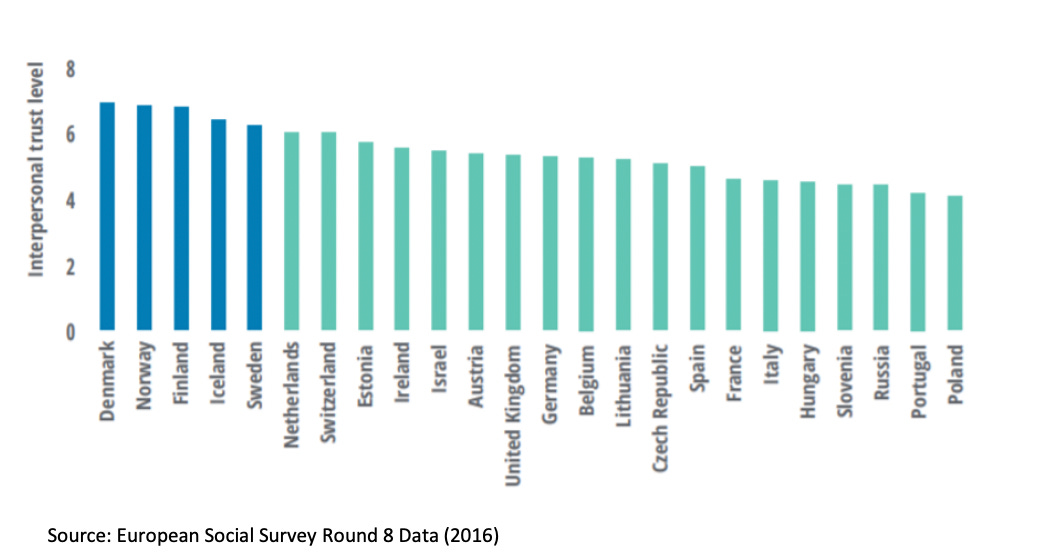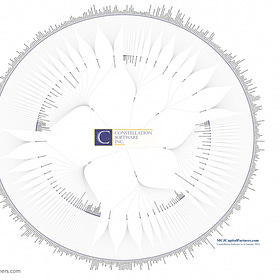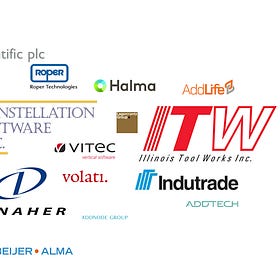In my journey to define a good-quality business that can have a net positive impact on society, I am slowly coming to terms with a few characteristics that are critical in building a startup or a business that can not only create intergenerational wealth but also impact society, nature, and biodiversity in general.
Trust as an Infrastructure <TaaI> » Embracing Decentralization!
If we want to replicate nature and the natural way of building a business or an organization, we should embrace decentralization. Some great CEOs have done that—whether Mark Leonard, Warren Buffett, Katharine Graham, or Henry Singleton—they all built a decentralized organization with extremely low corporate headcount.
Building a business with decentralization at its core means it is built on the core principle of trust and harmony with the people it works and works for. That is one of the most critical characteristics of a good quality business and can create impact. To me, the impact is not ESG reporting; impact is not an asset class; impact is a good quality value business that can exist now and after 100 years. It evolves, it takes care of people who work for that business, it contracts, it scales, it divests, its spin-offs, it acquires, but at its core, it creates trust between the employees, stakeholders, and shareholders.
But all of them have focused on JUST optimizing shareholder returns, and here I beg to differ. I believe shareholder returns are an end outcome but not an intermediary output that we should focus on as it will lead to short-sightedness; I believe the business's purpose is to optimize the value it creates for society & stakeholders <including nature, employees, biodiversity, etc.>.
I tried to pen down my first piece on Helsinki and Finland in one of my newsletters about Business for Peace, a research thesis by Dr. Tilman Bauer from Aalto University. I tried to connect some dots on the Finnish way and how this is the most critical lens businesses should consider while reimagining capitalism for good. Finland and Nordics are on to something; I am just trying to rationalize as an investor now - marrying venture, business for peace, and value investing. There is a lot to unpack, but I need to spend more time in Helsinki and study and invest as an outsider, seeing it as my Kotona1.
A Real-life Leader Practicing Decentralization!
I want to take the name of a leader who has inspired the work style that resonates with me. Her name is Claire Smith, founder of Beyond Impact and my colleague. Since 2017-2018, I have seen her as my mentor, and of course, she comes with so much experience, but the way she works is so hierarchy-less, almost like a decentralized organization - she gives ownership to the people she works with, and gives all the supporting tools to achieve the results. I sometimes feel indebted, and I want to see Claire even more successful because of her humbleness and grounding in leading the team.
This chart provides a fascinating insight into the correlation between societal trust and business practices, particularly highlighting the Nordic countries. These nations exhibit remarkably high levels of trust, which appears to translate directly into their business environment.
Notably, companies in these regions tend to demonstrate lower instances of fraud and fewer governance issues. This trend aligns closely with their generally strong performance in Environmental, Social, and Governance (ESG) metrics.
It's essential to view ESG not as a mere checklist of criteria to be ticked off but rather as a philosophical framework. This perspective allows us to gauge whether a company is fundamentally oriented towards creating a net positive impact on the world. Essentially, it becomes a measure of a business's commitment to fostering peace and sustainability in its broader context.
The Nordic example suggests that high-trust societies may be more likely to produce businesses that naturally align with these positive global objectives without necessarily focusing on ESG as a separate initiative.
Don’t Blitzscale - Say No to Hypergrowth!
One of the biggest culprits in modern-day capitalism that a lot of people celebrate too much is masculine, hyperscale (I call BlitzScaling - BS - Bullshit Scam run by Silicon Valley ponzies), crony, monolithic and centralized. It is BONKERS how much people give air time to people like Elon Musk; I mean, okay, even Warren Buffett can’t buy this guy; why are we talking about these people too much? They are not net value creators but destructors.
“Blitscaling is growth at all costs that don’t optimize for profit or efficiency, just growth and growth fueled by VC money…..It sounds very much against the fundamental business principles of building a sound business; instead, it relies on leveraging hyped-fueled venture capital money that is willing to fuel a Ponzi like no other day. This has many repercussions on society, people who work for the company, and the market overall. Also, it seems to be a very masculine approach to capitalism.” - Don’t BS [Blitscale]
Contraction & Expansion - Nature’s Way!
What struck me the most while listening to a podcast - “Investing by the Books” by Red Eye, interviewing the REQ Capital guy. He said value can be created when businesses shrink, which made me revisit my thoughts on capital allocation I shared last time. The idea of indefinite exponential growth is a pipe dream and a bonkers dystopia. Contraction and expansion is a natural phenomenon.
The idea of "Contraction & Expansion" in business mirrors nature's cyclical patterns, challenging the conventional notion of perpetual growth. This approach recognizes that value can be created not just through expansion but also through strategic contraction. Just as ecosystems go through periods of growth and retreat, businesses can benefit from alternating expansion and consolidation phases. During contraction, companies can streamline operations, focus on core competencies, and spark innovation through constraints. This cycle allows for more sustainable resource use, improved efficiency, and potentially greater resilience. For CEOs and founders, the key lies in recognizing the appropriate times for growth or contraction, allocating capital accordingly, and communicating this strategy effectively to stakeholders. By embracing this natural rhythm, businesses can achieve more sustainable long-term success while contributing positively to society and the environment.
Decentralization, don’t blitzcale, and contraction can also be great levers for creating value and impact. These three core concepts are key value drivers, and I believe all three need an embedded layer of trust as an infrastructure to build a resilient, long-lasting business.
I want to leave with some resources.
Finland, a high-performing and trusting society
Swedish legacy of decentralization
The Outsiders: Eight Unconventional CEOs and Their Radically Rational Blueprint for Success
Capital Allocation and Value Creation: A Market-Based Framework for Executives by Torbjörn Arenbo
Hidden Champions of the Twenty-First Century: The Success Strategies of Unknown World Market Leaders, by Hermann Simon
The Clock of the Long Now: Time and Responsibility by Stewart Brand
Have you read some of my pieces from the Not VC series? Please give it a read and share!
Capital Allocation
For the last few months, I have been diving deep into the intersection of private and public markets, and I keep coming back to the idea of micro-acquisition funds or serial acquirers. These are a hybrid of venture studios, conglomerates, acquisition arms, and capital allocators like Warren Buffet and Henry Singleton.
Serial Acquirer
Nearly a year ago, I became fascinated with the concept of serial acquirers or acquisition compounders. These are essentially decentralized conglomerates that grow through a steady stream of acquisitions, often micro-acquisitions. What intrigues them is that they view themselves not as operators or managers but as capital allocators and investors.
The case for micro acquisition funds
As an operator turned impact investor and venture capitalist, I tend to view assets through a business lens, echoing Warren Buffet’s perspective that
Case against (over) diversification
I have seen people throw this word as if investing in 40-50 companies reduces their risk of bad decision-making and selection processes. That’s far away from the truth.
Finnish word means the state of being, where you feel at home.









